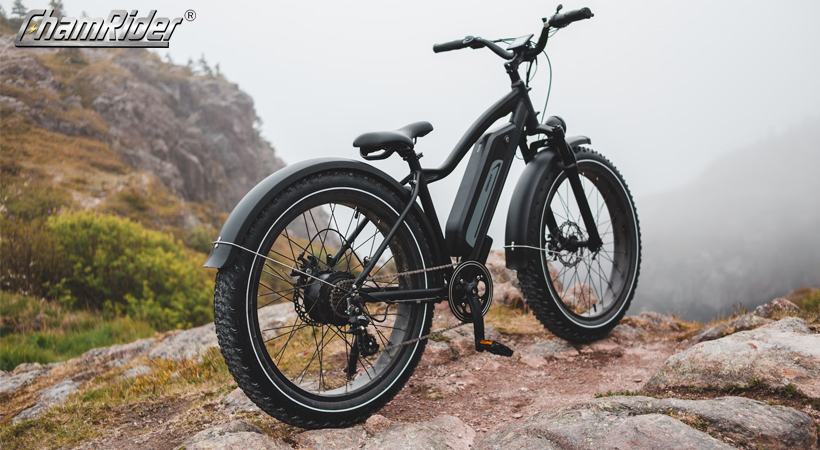When it comes to our passion for electric bicycles, we strive to maximize the benefits and enhance performance. Therefore, a common question arises: Can we add a larger battery to our e-bike to increase range and speed?
Yes, you can install a larger battery on your electric bicycle to achieve greater range and, in some cases, improve speed. However, this is not a DIY project. If you desire this feature, you may need to purchase a bike with expandable battery storage.
Read on to learn more about how battery life affects performance, the impact of removing the battery from the frame, and tips for improving the e-bike range!
How does battery life impact e-bike performance?
Removing the electric bike battery from the frame.
Battery life refers to the total number of charge cycles (from 0 to 100%) a battery can endure before it stops working. Your battery's lifecycle will affect overall performance. Batteries nearing the end of their lifecycle will not last as long or hold charge effectively.

The expected lifespan of an e-bike battery depends on the battery type. The most common battery types include:
Lithium batteries, the most prevalent type, can typically handle around 1,000 charge cycles.
Nickel batteries have an estimated lifespan of around 500 charge cycles.
Lead batteries have a lifespan of approximately 300 charge cycles.
While battery lifespan is important and impacts performance, battery capacity, and range are crucial factors in choosing a battery. Range refers to how far you can travel on a single charge, while capacity refers to the duration of the ride.
Not all brands and manufacturers accurately describe their model ranges, but as a general rule of thumb, here are some figures:
250-500Wh: Within this range, your bike will be very basic and standard, with an estimated range of 25 miles per charge.
500-800Wh: This range indicates entry into the high-end segment, typically providing a range of over 30 miles per charge.
800+Wh: These are premium and luxury battery series. With this type of battery, you can expect a range of over 40 miles per charge.
Think of capacity like a fuel tank on a car; the more it can hold, the longer you can travel. Battery capacity operates similarly; the larger the capacity, the greater the distance it can cover.
If you are considering upgrading to a larger battery for your current e-bike, be sure to check the capacity and range.

Can you retrofit an electric bicycle with a larger battery?
Not all electric bicycle batteries are interchangeable.
Electric bicycles come in various designs and configurations. If you have the knowledge and skills, you may be able to equip your bike with a different battery. However, for most people and many models of bicycles, the battery is integrated into the bike itself.
Let's take the example of the ChamRider Integrated Battery SSE-125 SEA LION II model. It comes with a removable integrated battery, and you can upgrade that battery, but you can only use parts provided by the manufacturer. To enhance the battery capacity and fully leverage the bike's performance, you would need to spend around $500, which is nearly half the price of the bike itself.
Can batteries with different voltages (36v, 48v, 52v, etc.) be interchangeable?
The answer to this question is somewhat complex as it largely depends on your specific model and manufacturer. Depending on the type of controller you have, it may be possible to accept a range of voltages such as 24v-36v or 36v-48v. You would need to look up the specific details of your model to determine this.
The concern here is that a higher voltage battery could potentially fry the motor and electronic components. Running a higher voltage battery on a model that doesn't support it can result in the motor being permanently damaged.
That being said, many manufacturers build in a significant safety margin to account for these types of situations. Nonetheless, it's important to check with your model and manufacturer to avoid damaging your electric bicycle.
Adding additional batteries (expanding) to an existing battery
Adding more batteries to an existing battery is not a straightforward task and is not suitable for beginners. If you're looking for an upgrade, it's generally better to choose a higher-end model in the long run.
When adding more batteries to an existing setup, you need to know what you're doing. Lithium-ion batteries, in particular, can be dangerous and may cause minor explosions. Assuming you don't encounter an explosion, adding additional batteries can lead to issues of imbalance, premature battery death, and potential battery failures.
Most importantly, if you don't know what you're doing, do not attempt this operation. Adding more batteries can damage the batteries and potentially be life-threatening.

Will adding a larger battery increase speed and range?
When it comes to increasing speed and range, adding a larger battery is not a simple task and is much more complicated than it may seem.
In short, adding a larger battery can be dangerous, damage your bike, or be a very complex issue that isn't worth the trouble. To increase the speed of your bike, you would need to somehow increase the battery capacity.
Capacity doesn't necessarily mean faster speed, but it can represent a larger range. Watt-hours (Wh) is the measurement unit used to determine the battery pack's capacity, which allows you to measure the range. To calculate it, multiply the voltage by the amp-hour rating of the battery pack. For example, a 36V 10Ah battery pack has a capacity of 360 watt-hours (36 x 10 = 360). Assuming you use about 20 watt-hours per mile, then you can travel 18 miles.
In theory, having a larger capacity battery would allow you to ride for a longer duration. However, this is not a simple task and should be left to professionals. But what is the best way to increase the range of an electric bike without adding a larger battery?
What is the best way to increase the range of an electric bike?
For an electric bike, how you use the bike is just as crucial to the battery and motor as the bike itself. The terrain you ride on, how you handle the bike, and even the wind can affect the bike's range.
How much does it cost to replace an electric bike battery?
The cost of an electric bike battery can vary widely but typically ranges from $200 to over $900. The range depends on factors such as the brand, capacity, and quality of the battery.
Let's take the example of a battery like the ChamRider 36V 48V Electric Bike Battery. This battery has a voltage of 48V and a capacity of 10Ah, and it is priced quite reasonably. You won't get the support of a high-end brand, but this battery can provide a range of 20-30 miles on a single charge.
With options closer to or above $800, you'll be spending more on the brand and quality. Mid-range prices of $400-$600 should be sufficient to get the job done quite well.

Another factor that can affect the price of a battery is whether it is an external battery or an integrated battery. For integrated in-frame batteries, you may need to pay more compared to external options.
Please keep in mind that while the upfront cost may be high, purchasing a replacement battery is a worthwhile investment. Buying a replacement battery can effectively double your range and provide peace of mind in case of emergencies. The decision depends on you and your budget, but we highly recommend having a spare battery!




Comments (0)
There are no comments for this article. Be the first one to leave a message!